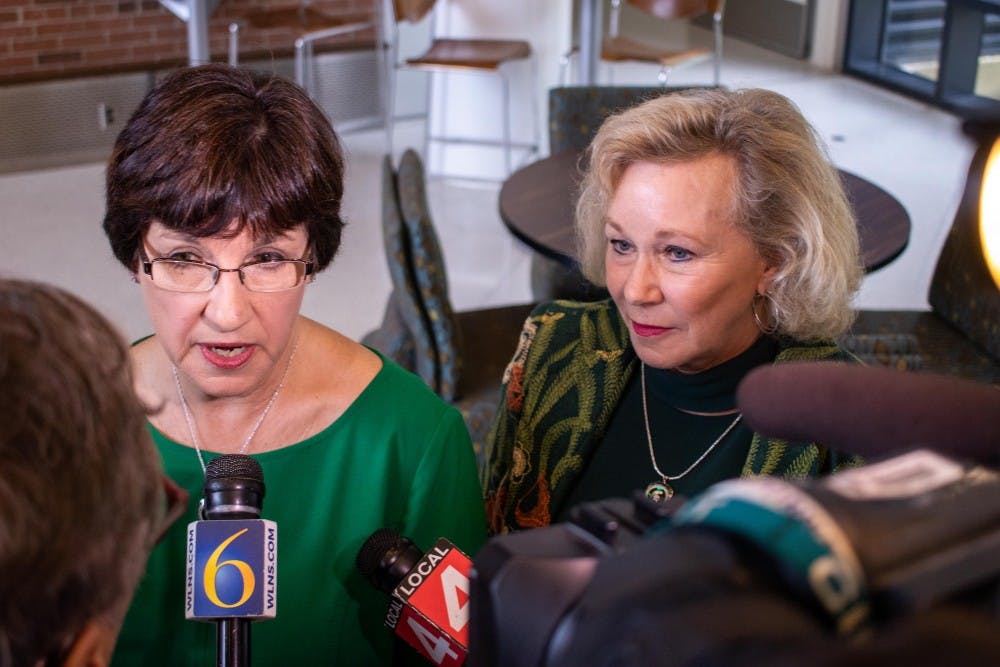Michigan State is deep into the “listening phase” of the presidential search process. The search committee is focusing on input sessions for student groups, colleges and other members of the campus community.
Reclaim MSU, a student activist organization, released a statement of distrust in the presidential search process, search committee and the recently held input sessions.
“We do not trust this process,” the statement reads. “Our community has described and endorsed an inclusive and open presidential search. The Board of Trustees has not listened.”
The dates, times and locations of these input sessions are not available on the official presidential search website. Those interested in attending the input sessions must either contact the dean’s office for details or wait to receive an email from their college.
Comparative cultures and politics junior Natalie Rogers, the communication coordinator for Reclaim MSU, said information on the dates, times and locations aren’t being sent out soon enough and that they’re being scheduled at times that are inconvenient to students.
ASMSU College of Music representative Isaiah Hawkins said he was one of the only students who attended the input session held for his college because it was at a time almost every student had class. He said that because the sessions have already been scheduled, the committee should take time to work on advertising them.
“I think it’s best to increase the amount of marketing for them,” Hawkins said. “A lot of that has just been through emails and public postings on social media, so a lot of people aren’t finding out about these sessions, which is a huge issue.”
Separate from the input sessions held by the committee, ASMSU will hold student forums where students can provide their input. ASMSU President Katherine “Cookie” Rifiotis said these forums will be more convenient for students.
“A lot of the presidential search input sessions have been between 9 and 5 to make sure that faculty and staff are on campus so that they can attend,” Rifiotis said in a previous interview. “Unfortunately, if you’re going to make something geared towards students, it has to be later in the day.”
The presidential search committee, made up of 19 people — including half of the Board of Trustees — has one undergraduate student and one graduate student.
ASMSU representative Colin Wiebrecht, who represents the Alliance of Queer and Ally Students, attended a couple input sessions. He spoke out about the flaws of the presidential search committee, process and listening phase at the session held for the Council of Racial and Ethnic Students and the Council of Progressive Students.
He said the amount of trustees on the committee is concerning, as well as that students were not given the option to choose who they wanted to represent them in the presidential search.
“They talk about how diverse they are, and it’s ten men, nine women. That already doesn’t sound great,” Wiebrecht said. “It’s very much the illusion of diversity, they’re trying to say ‘we checked all the boxes’ but that doesn’t mean anything if you don’t give people the opportunity to choose who they want to represent them.”
Reclaim MSU’s statement said the presidential search process has not been as open or inclusive as it should be. Rogers expressed concern that asking questions of the committee is not allowed.
“They’re holding these input sessions, but that doesn’t mean anything if they’re not listening,” Wiebrecht said. “It’s one thing to listen, but it’s another thing to act on those things and put them into practice and they haven’t done that, they haven’t shown us that, especially in the last year.”
At the input sessions Wiebrecht attended, he expressed to the committee that there is still time to change the presidential search committee and process to include more student input.
“It’s tough because the people on the committee are really committed to doing the right thing, it’s very admirable that they’re dedicating their time and coming to these sessions,” Rogers said. “But at the same time, having input isn’t really having any real power in the process, especially because the way that these are being conducted aren’t really a conversation.”
Hawkins said although he shares some of the concerns other students have about the process, he has hope their voices will be heard.
“I know there’s a lot of distrust in the process because of how little student representation is on the committee, which is something that I’m pretty upset about as well,” Hawkins said. “But from my experience with the individual committee members themselves, they are all extremely receptive to student input, to having student voices and picking the best president.”
Support student media!
Please consider donating to The State News and help fund the future of journalism.
Discussion
Share and discuss “Students express concerns about the presidential search input sessions” on social media.







